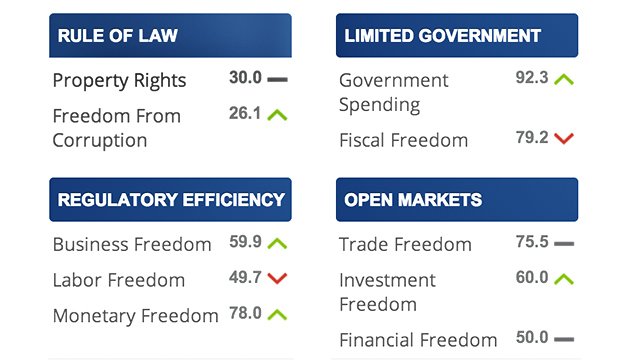SUMMARY
This is AI generated summarization, which may have errors. For context, always refer to the full article.

MANILA, Philippines – The Philippine economy is “moderately free,” improving its score for the third consecutive year, according to a Washington-based think tank that has been doing an index of countries for two decades.
The Heritage Foundation released on Tuesday, January 14, its 2014 Index of Economic Freedom, which shows the Philippines with a score of 60.1, improving its ranking by 8 places, from 97th in 2013 to 89th for 2014.
The foundation stressed that economic freedom exists in a country if every citizen is able to control his or her own labor and property. Economic freedom also means that each citizen is unconstrained by the state and able to freely work, consume, and invest.
The Philippines’ score is 1.9 points higher than last year’s 58.2 due to the significant improvements in investment freedom, business freedom, monetary freedom, and the control of government spending.
The country has advanced by 5.1 points since the Index started 20 years ago. This is also the third consecutive year that Philippines overall score has improved.
“With its third consecutive year of overall score improvement, the Philippines has risen back to ‘moderately free’ in the 2014 Index,” the Heritage Foundation noted.
The Philippines ranked 16th out of 42 countries in the Asia–Pacific region, but the country’s overall score is slightly below the world average of 60.3.
“The government has pursued a series of legislative reforms to enhance the investment environment and incentivize broader-based private-sector job growth. Despite progress, lingering institutional challenges will not be overcome without a deeper commitment to reform. Although the perceived level of corruption has declined, more effective anti-corruption measures need to be firmly institutionalized,” the Heritage Foundation said.
Presidential Spokesperson Edwin Lacierda said the results mirror the good governance platform of the Aquino administration.
He added that the rankings show the consistency of the administration in implementing much needed reforms in the government.
“The Heritage Foundation also cited our economy’s ‘high degree of resilience,’ as well as the legislative reforms that have been laid down ‘to enhance the investment environment and incentivize broader-based private-sector job growth.’ These factors were also cited in the 2013 report, displaying the government’s consistency in its reform agenda,” Lacierda noted.
Four pillars
Economic freedom is measured using 4 pillars: Rule of Law, Limited Government, Regulatory Efficiency, and Open Markets.
The Philippines fared best in the Limited Government pillar, with index score in government spending increasing from 90.2 to 92.3; and index score for fiscal freedom, from 79.2 to 79.3.
For Rule of Law, the pillar that measures freedom based on property rights and freedom from corruption, the Philippines kept its score of 30 for property rights, while it improved in terms freedom from corruption from 26 to 26.1.
“Corruption and cronyism are rife in business and government, with a few dozen leading families holding an outsized share of wealth and political power. Judicial independence has traditionally been strong, but the rule of law is generally weak. A culture of impunity, stemming in part from a case backlog in the judicial system, hampers the fight against corruption. Delays and uncertainty negatively affect property rights,” the Heritage Foundation noted.
The country also made progress in some areas of Regulatory Efficiency pillar, which measures the ease of doing business, monetary freedom, and labor freedom. The country scoreed 59.9 in business freedom and 78 points in monetary freedom. Labor freedom, however, significantly declined from 76.6 to 49.7.
“Launching a business takes 15 procedures and 35 days. The time needed to deal with licensing requirements has been notably reduced, and the cost of completing them has been cut to less than the level of average annual income.The labor market remains structurally rigid, although existing regulations are not particularly burdensome,” the Heritage Foundation said.
For Freedom Markets, the country maintained its score in trade freedom and financial freedom at 75.5 and 50, respectively. Its index score for investment freedom improved to 60 from last year’s 50.
A total of 114 countries out of 178 improved their scores, while 59 countries declined in this year’s index. Hong Kong topped the list with a score of 90.1, followed by Singapore and Australia, with scores of 89.4 and 82, respectively. – Rappler.com
Add a comment
How does this make you feel?
There are no comments yet. Add your comment to start the conversation.